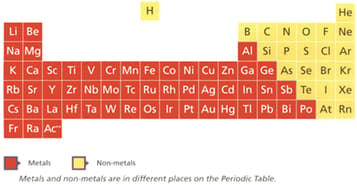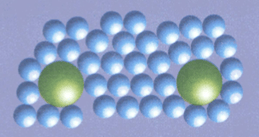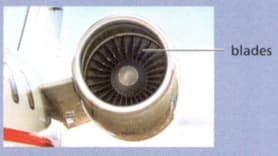
List the symbols and names of any three metals shown in the figure.


Important Questions on Metals, Non-metals and Corrosion
Use the information to decide if the material is metal or non-metal.
A shiny material that conducts electricity.
Use the information to decide if the material is metal or non-metal.
A dull, brittle material.
Use the information to decide if the material is metal or non-metal.
A gas at room temperature.
Use the information to decide if the material is a metal or non-metal.
A malleable material that is solid at room temperature.
If you mix iron with other metal elements or carbon it forms an alloy called steel. This changes the regular structure of the pure metal. In the diagram, the different colours show the different atoms in steel.

Use the diagram to suggest why steel is less malleable than pure iron.
An engineer is choosing a material to make the blades on jet engine blades.

Suggest what physical properties the material must have. Give reasons for your choices.
Non-metals can also have unusual properties. For the following non-metal, say which property is unusual (there might be more than one).
Graphite is a form of carbon. It is dull, soft, can conduct electricity and has a higher melting point than any metal element .
Non-metals can also have unusual properties. For the following non-metal, say which property is unusual (there might be more than one).
Silicon is a shiny, brittle insulator.
